|

|
April 28, 2011
Posted: 1340 GMT
Saying “I Do” in the Gulf By Jenifer Fenton If you have a question about anything Emirati, “Ask Ali,” real name Ali Alsaloom, is the one with the answer. The Emirati author and television host has his own online portal http://www.ask-ali.com where he answers queries about his culture. Alsaloom also has a cultural consultancy Embrace Arabia dedicated to intercultural awareness. He studied hospitality as an undergraduate, has a Masters in Business Administration and has travelled extensively. I asked “Ask Ali" about weddings in his country.
The term “recommended” marriages would be a more appropriate term since this is actually what families would do – they would “screen” the social circles of the family for potential matches. Once potential partners for single relatives get into the focus of the families, a bit of research will be done to find out more about this potential partner. Only then a formal contact will be initiated between the families. If both families agree to a potential partnership, the two “candidates” will be asked their opinion. And only if both agree, they will be formally introduced and meet in the presence of some relatives. Only after this meeting and only with agreement of bride and groom-to-be will the engagement and marriage be arranged. What happens at a royal wedding in the UAE? The legal paperwork is all based on our Islamic Sharia Law, so nothing is different from the public weddings. Basically royal weddings are nothing more than other weddings when it comes to the formalities. The father or guardian of the bride and the groom sign the marriage contract in the presence of the religious leader and the witnesses – and like this, the marriage is formally acknowledged. But the main difference is that our royal families, because of their tribal background, definitely consider the importance of tying the knot with other royal members from other Emirates or other royal families from neighbouring sheikdoms to strengthen their political position; also to strengthen the relationships between both royal families and the countries for the future. This is something that existed in most royal weddings around the world and not just here in the UAE. But having said that, there is also the regular royal weddings which consist of a sheikh from royal family “x” to a “y“ sheikha from another Emirati royal family or from a well known tribe from the UAE. So a mix of both do exist. Usually a few weeks after this, there will be separate celebrations for the men and the women. The groom will usually host more of a reception-style party, where relatives and friends – and in case of members of the royal families national and international dignitaries – will come to congratulate. For the bride usually a lavish “ladies-only” party will be held. The groom will usually come in the late hours of the evening to this party to greet his bride, take the official pictures, meet the well-wishers and then take his wife with him. A royal wedding might see more guests, but even the most “humble” local wedding will not see less than 300 guests. Of course, the budget of the couple will determine location and menu, not their status. Is a marriage ceremony to a second wife different? Even though a Muslim man can marry up to four wives, if he has valid reasons and is convinced that he can support and treat his wives with equal care and attention, multiple marriages here in the UAE are the exception, not the norm. The formal ceremony is exactly the same: signing the contract in the presence of a sheikh and the witnesses. Parties are at the discretion of the couple and they can range from absolutely nothing to a lavish celebration. Are there prenuptials in the Gulf States? We don’t have prenuptial agreements in Islam, therefore a country like the UAE that implements Sharia Law won’t approve a prenuptial agreement. But what we do have is a Sharia Law marriage agreement which automatically entitles the woman, after getting married and God forbid she gets a divorce, to alimony to support her as well as any children. The custom from many men, when they divorce, is to leave their house to their wife along with the children for convenience. Here it is customary that the groom gives the bride the so-called “dowry”, this is an amount of money or wealth for her to have as a financial backup. This is completely hers and she is free to use this as she wishes. However, in our Islamic Sharia Law, as well as our culture, it is entirely the responsibility of the man to take care of his wife and to share his wealth with her. Ali Alsaloom is the author of “Ask Ali: A guide to Abu Dhabi” and “Ask Ali: A guide to Dubai”. He is from Abu Dhabi. Posted by: CNN Producer Jenifer Fenton
April 25, 2011
Posted: 744 GMT
The Emirates are promising reform while at the same time suppressing dissent By Jenifer Fenton Last week the United Arab Emirates dissolved the elected board of directors of the Jurist Association, a prominent civil rights organization, replacing the board with state appointees, according to Human Rights Watch. The group was one of four nongovernmental organizations that signed a petition to President Sheikh Khalifa bin Zayed Al Nahyan and the members of the Supreme Council of the seven Emirates on March 9 asking for direct elections. The petition also asked that the Federal National Council (FNC) be granted legislative powers. The body is only an advisory one. According to Human Rights Watch, the Jurist Association was said to have violated the UAE’s Law on Associations, which bans NGOs from interfering "in politics or in matters that impair State security and its ruling regime." Four activists have also been arrested recently. Three are still in detention and one has been released, according to activist Mohammed al-Mansoori. There are seven emirates, including Abu Dhabi and Dubai. Each is ruled by an Emir – and together they choose a President for the UAE. Analysts say they appear to be adopting a twin-track approach to political activity – clamping down on dissent while promising reform and taking steps to stave off the potential for unrest. The UAE have not seen street protests, but are sensitive to the unrest sweeping the Arab world. The UAE have said they plan to hold elections in September to select representatives for the FNC. The last elections were in 2006. Currently there are 40 members of the FNC: half are elected by the electoral college and the other half are nominated by their Emirate. The electoral college, which includes a small percentage of women, is chosen by the rulers of the UAE and its members are the only ones allowed to vote or run for office. The UAE have also said that they plan to increase the size of the electoral college, which has 6,689 members. “We are confident that increasing the number of electoral colleges will promote political participation,” said Anwar Gargash, Minister of State for Foreign Affairs said in a statement to WAM, the Emirates’ news agency. “It reflects the spirit of the political program of UAE and we expect that the electoral colleges will bring in more expertise, representing the significant evolution of the UAE society. The latest developments in the region validate the wise approach adopted by the UAE leadership to make sure that change is in perfect harmony with progress." Ahmed Mansoor, an Emirati blogger who signed the petition to the UAE president asking for direct elections was the first known activist to be detained. Mansoor is being held in Al Wathba prison in Abu Dhabi, according to his wife Nadia. He has not been charged with a crime. Fahad Salem al-Shehhi, a friend of Mansoor's who helped him with his website, and Nasser bin Ghaith, an Emirati writer who also maintains a website, have also been detained, according to al-Mansoori. A fourth activist, Abdullah al-Shehhi was taken from the Emirate of Ras Al Khaimah. Al-Shehhi previously served in the UAE armed forces and has been arrested three times before, al-Mansoori said. He was released due to ongoing health problem, al-Mansoori said. None of the activists has been charged yet, according to al-Mansoori. “The prosecution in the UAE has sent subpoenas to a number of people,” Sheikh Abdullah bin Zayed al-Nahyan, UAE Minister of Foreign Affairs, said last week at a press conference. “This is fully in procedure with the laws and rules of the UAE. We have full trust that our laws are clear and transparent,” he said. “I do not believe that any person is above the law.” Abdulkhaleq Abdulla, Professor of Political Science at Emirates University, said he believed that it was time for the Emirates to change. An ideal situation would be one were “there will be complete elections for everybody. There would be an elected FNC,” Abdulla said. “The sooner the better for the UAE.” When asked about the arrest of the activists Abdulla said, “It shows that the UAE probably is not in their political reform mind. They are falling behind. I think they are sending messages that they are not buying into this reform that is sweeping the Arab world. And they think that we are happy with the stability that we are in. That we are happy with the way things are.” More than eight million people live in the Emirates, but Emiratis account for only 11.5 percent of that number. Most are migrant workers. Recently the UAE has announced changes meant to improve the lives of Emiratis. In March, the Emirates ordered a 70 percent increase in pensions for retired military personnel. The WAM statement said “The President's generous gesture is given as part of his keenness to ensure ways of decent living for the citizens.” The same month the UAE president ordered that $1.55 billion be invested in the expansion of water and electricity supply sector in the northern emirates, which are less developed and less affluent. Other recent directives have included: approving the construction of hundreds of villas for citizens throughout the UAE and increasing job opportunities for Emirates. But as events elsewhere in the Middle East have shown, such largesse has not always mollified those whose grievances are principally political. Posted by: Jenifer Fenton
April 24, 2011
Posted: 1202 GMT
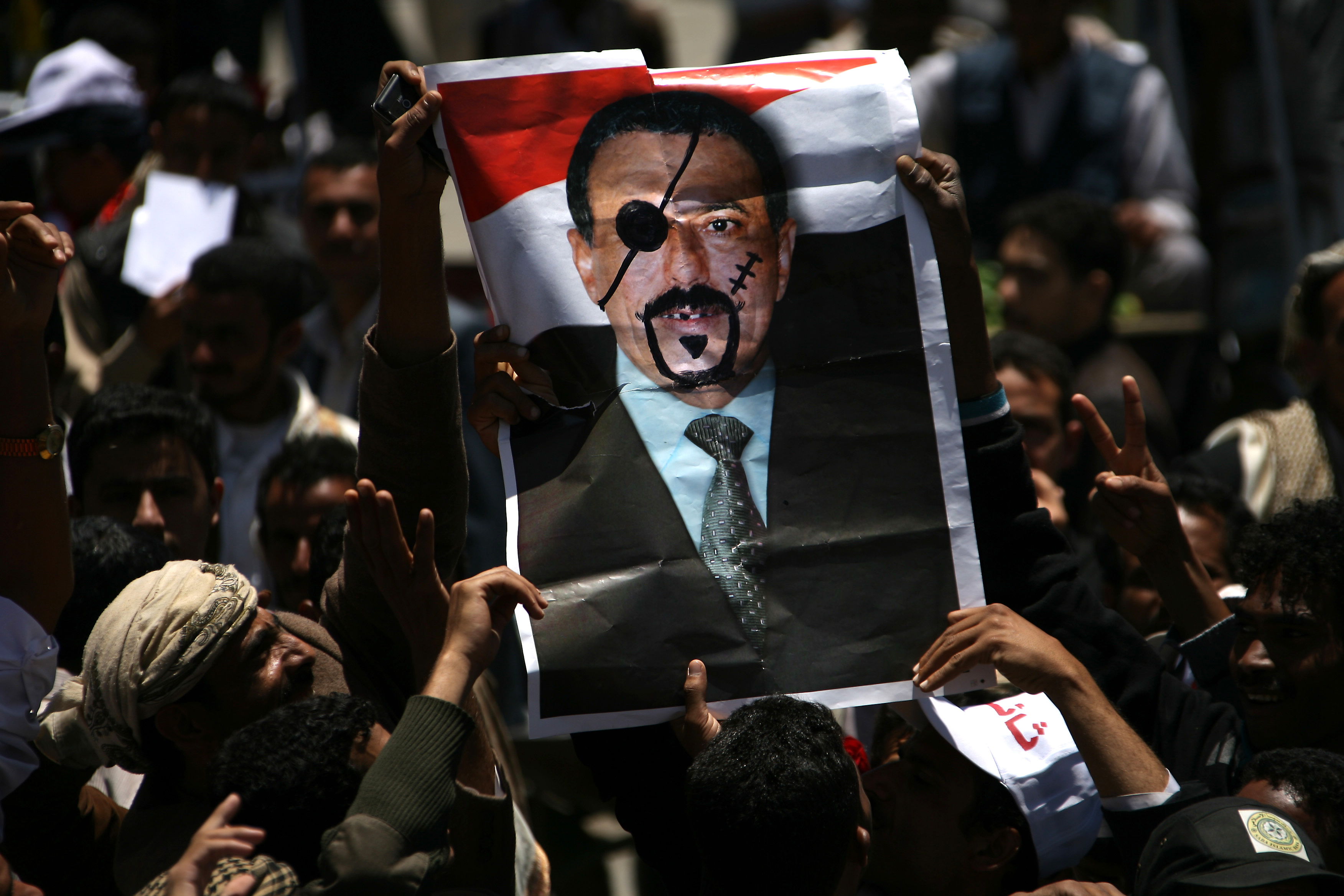 Yemeni anti-government protesters hold a picture of President Ali Abdullah Saleh depicting him as a pirate during a demonstration calling for his ouster in Sanaa. Yemen's embattled President Ali Abdullah Saleh has accepted a deal brokered by neighboring Persian Gulf nations to step down, Yemeni officials said Saturday. Both Saleh and the Yemeni opposition have agreed to the deal in principle. But Saleh has yet to sign the agreement, which stipulates he leave office within 30 days and provides complete immunity for him and those who served in his regime, said a senior foreign ministry official, who requested anonymity because he is not authorized to speak to the media. Mohammed Albasha, spokesman for the Yemeni Embassy in Washington, said the opposition has to accept the final deal before Saleh will sign. The agreement also calls for a unity government to be formed within seven days. Read more... Posted by: IME Producer
April 19, 2011
Posted: 906 GMT
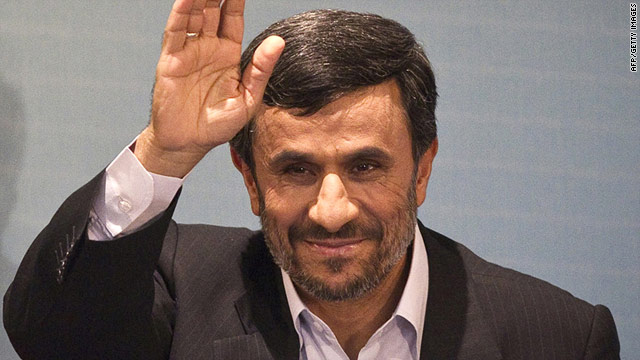 Mahmoud Ahmadinejad says the West is seeking destruction and a reinforcement of their evil dominance in the region. Iranian President Mahmoud Ahmadinejad blamed the West for unrest bubbling throughout the Middle East and North Africa in a speech Monday on Iran's National Army Day. "They are trying to foment discord in the region. They are trying to cause destruction and provoke wars between nations and governments in order to sell their weapons," Ahmadinejad said in a speech translated into English by state-run Press TV. "They are seeking destruction and a reinforcement of their evil dominance in the region." The Iranian president's accusations come as NATO planes are enforcing a U.N.-approved no-fly zone over Libya and also are launching airstrikes on Libyan government troops as opposition forces battle them. Ahmadinejad also warned of what he said are Western efforts to trigger sectarian strife between Shia and Sunni Muslims, while calling for cooperation between nations in the region. Unrest has spread across parts of the Middle East and North Africa since January when popular uprisings began in Tunisia and Egypt, which eventually unseated the governments there. The political unease has spread in varying degrees to more than a dozen other nations. Posted by: IME Producer
April 17, 2011
Posted: 955 GMT
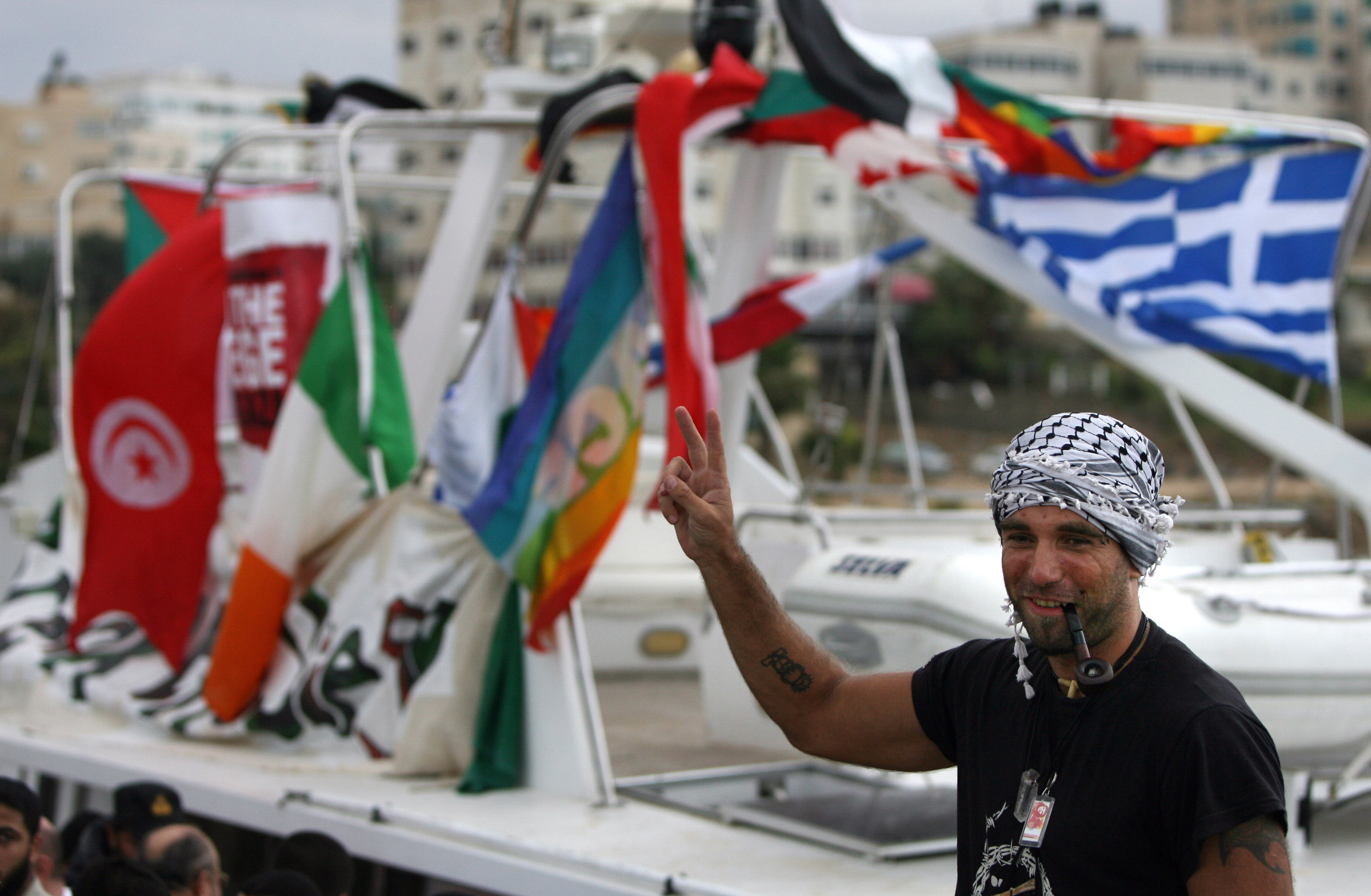 Vittorio Arrigoni at the port in Gaza City celebrating the arrival of the ship Dignity that departed from Cyprus to protest against the Israeli sanctions. A Salafist group of radical Islamists killed the Italian activist after kidnapping him in Gaza Getty Images AFP. An Italian humanitarian activist and journalist who was kidnapped in Gaza has been found dead and one person is in custody, the Hamas Interior Ministry said Friday in a statement. Police investigating the case learned where 36-year-old Vittorio Arrigoni was being held and went to the location, where they found the body, the statement said. An autopsy revealed that he had been killed hours before police entered the location, it said. The grisly outcome came hours after a video was posted on YouTube showing a man identified by his colleagues as Arrigoni. A black blindfold covered his eyes; his right cheek appeared red as though it had been hit; his hands appeared to be bound behind his back. A hand belonging to someone outside of the view of the lens appeared to be grasping his hair on the back and pointing the captive's head toward the camera. Read more... Posted by: IME Producer
April 13, 2011
Posted: 959 GMT
 File photo of Alaa, left, and Gamal Mubarak, sons of former Egyptian president Hosni Mubarak, attending a football match on January 31, 2010.. Prosecutors have ordered that former Egyptian President Hosni Mubarak and two of his sons be held in detention for 15 days as they are investigated, state TV reported Wednesday. "The general prosecutor decided to hold Gamal and Alaa Mubarak for 15 days for investigation in charges of killing of protesters in Tahrir Square," Nile TV reported. The square was a popular gathering spot for those opposed to the Mubarak government. The developments came a day after the former president was admitted to a hospital after complaining to his doctor that he felt unwell, according to a spokesman for the Egyptian military. A military source said Mubarak's condition was stable, not critical, and that his wife and elder son were with him. Egyptian state television reported Mubarak suffered a heart attack during questioning over possible corruption charges. Justice Minister Mohammed Abdul Aziz Al-Gindi said the prosecutor's office had started its investigation of the former president, the official Egyptian news agency reported. Read more... Posted by: IME Producer
April 11, 2011
Posted: 1237 GMT
April 10, 2011
Posted: 1334 GMT
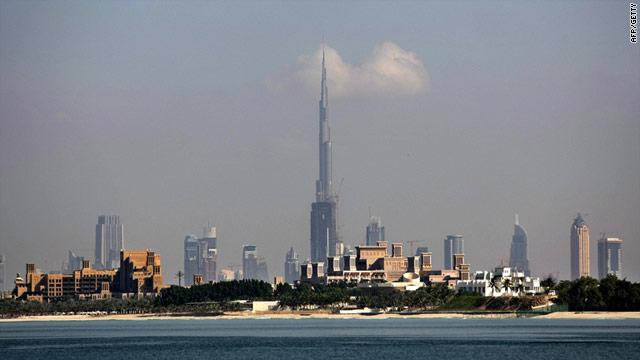 Ahmed Mansoor was taken from his home in Dubai on Friday his wife says. Mansoor has called for poltical reform in the UAE. A blogger and political activist who has called for reform in the United Arab Emirates has not been heard from since he was taken from his Dubai apartment Friday, his wife said. About 10 men, including two wearing police uniforms, picked up Ahmed Mansoor from his apartment Friday afternoon, said his wife, Nadia. The men also took Mansoor's passport and laptop and left without telling his wife where they were taking him or why. Lt. General Dhahi Khalfan Tamim, the commander-in-chief of Dubai police, said he was not aware whether Mansoor had been arrested, but promised to look into it. CNN has also sent queries to other Emirati officials inquiring about Mansoor but have not heard back. Posted by: IME Producer
April 7, 2011
Posted: 806 GMT
"This is our happy-land," said Hamad Awidat standing next to a minefield in Majdal Shams, a village in the Israeli-controlled northern Golan Heights, as he points at the Syrian side of the disengagement line. Nestled on a hillside with an Israeli Army base situated at its center this Druze village is a mere stone's throw away from Syrian-controlled land, but because of the minefields separating its residents from their families on the other side, it might as well be a world away. "I would rather live under a Syrian dictatorship, than under an Israeli democracy," said the 26 year-old television producer who harbors no illusions about the economic benefits of living on what he calls the "wrong side of the minefield." "Economically I can tell you the situation here is not perfect but very good. You can see, it's very good. We live in a nice situation. We are working, making money. It's nice. But because of the pressure of the political situation, we cannot enjoy much with our money. This is the problem," he said, taking another drag on his cigarette. The political no man's land of people living in Majdal Shams and the villages of Buqata, Mas'ada and Ein Kuniya puts them in a unique situation in the Middle East, a region where the unusual, strange and sometimes downright bizarre meet on a daily basis. The Druze are a secretive monotheistic religious sect that trace their origins to 11th Century Egypt. They number about a quarter of a million with most concentrated in Syria, Israel and Lebanon. While many of the Druze living inside Israel today have Israeli nationality and are staunchly loyal to the Jewish State, their counterparts in the northern Golan rejected Israeli nationality in 1981 and have remained loyal to Syria until this day. Posted by: Dan Morgan
April 5, 2011
Posted: 1942 GMT
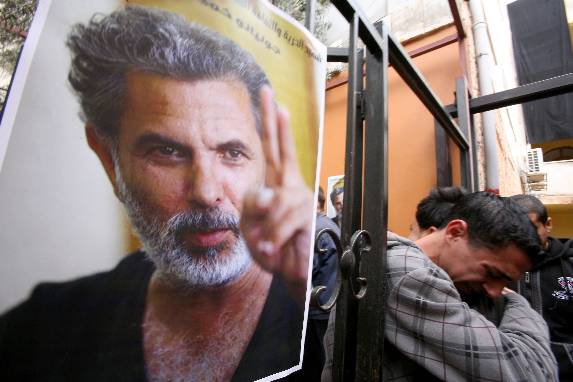 Palestinian youths mourn the death of Arab-Jewish actor and director Juliano Mer-Khamis (poster) outside The Freedom Theatre in Jenin refugee camp in the West Bank Thousands gathered in the West Bank Tuesday in memorials for noted Israeli Palestinian actor, director, and political activist Juliano Mer-Khamis. Mer-Khamis, 53, was gunned down Monday outside the Freedom Theatre in Jenin refugee camp – an institution he helped found to introduce Palestinian children to the performing arts. His death at the hands of an unknown masked gunman, sent shock waves through Jenin and the artistic community in both the West Bank and Israel where his work in local theatre was well-known. Born to an Israeli-Jewish mother and a Palestinian Christian father, Mer-Khamis believed theatre and music could be used to empower Palestinian children to fight against Israel’s occupation of the West Bank. The theatre opened its doors in 1988 in the middle of the first Palestinian intifada and amidst several closures, attacks, and robberies managed to stay in operation teaching thousands of Palestinians children. In a 2008 video Mer-Khamis described the Freedom Theatre project as “a venue to join the Palestinian people for their struggle for their liberation” “We believe that the third intifada, the coming intifada should be a cultural intifada with theatre, music, cameras and magazines.” he said. “We hope this theatre will generate a political artist movement of artists who will raise their voice against women discrimination, against children discrimination, against violence, unnecessary violence against civilians, to bring back a just cause – we are not terrorists. To me freedom is The Freedom Theatre" Palestinian police say they have arrested several men in connection with the shooting but have not named a suspect. The Palestinian Authority Prime Minister Salam Fayyad was quick to condemn Mer-Khamis’s death saying “This despicable crime will not be tolerated under any circumstances; it constitutes a severe violation of our principles and values and goes against our peoples’ morals and beliefs in co-existence.” Mer-Khamis is survived by his wife and two children from a previous marriage. In a testimonial to their former mentor a group of current Freedom Theatre students wrote “your children are going to stay, following your path on the way to the freedom battle, and we will go on with your revolution’s promise, the Jasmine revolution.” Posted by: Kareem Khadder
|
This blog has now been archived and commenting has been switched off. Visit the Inside the Middle East site for news, views and video from across the region. Read more about CNN's special reports policy Categories
Archive
|